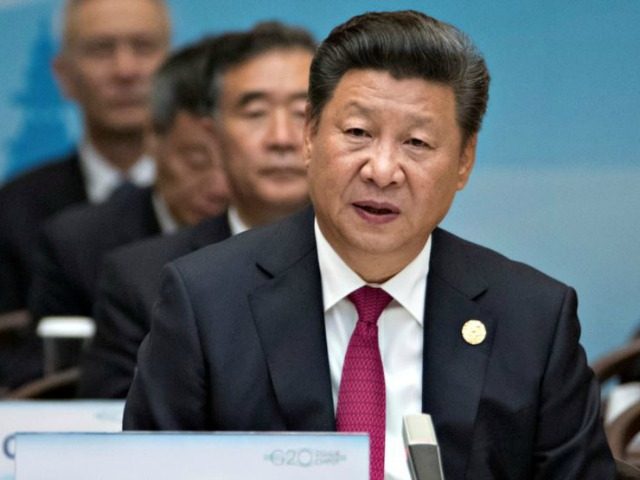China’s Internet censors immediately cracked down on search engines and social media outlets after President Xi Jinping accidentally told a group of business leaders to “undress” during a speech at this week’s G-20 summit.
Speaking at the Business 20 summit in Hangzhou, Xi attempted to quote an ancient Chinese text, according to the Hong Kong Free Press, that reads, “Lighten the tariffs, straighten the roads, facilitate trade, and ease agricultural policy.” Due to similarities in the Chinese characters, however, Xi told the audience to “undress” instead of “ease agricultural policy” – “kuanyi” being the former character, and “kuannong” what Xi should have said.
The Free Press reports that the social network Weibo appeared to have been scrubbed of any mention of the incident, as the word “undress” did not yield any results. Voice of America’s Mandarin outlet confirms that Weibo is not showing any results related to the incident. The Free Press adds that, using a site that compiles censored Weibo posts, it found at least two posts mentioning Xi’s gaffe that were removed from Weibo.
Voice of America notes that, of course, state-run Chinese media outlets did not mention the error, even in articles praising Xi’s speech for attracting business to China. While Xi’s speech was well-received in Chinese state-controlled media, outside observers have noted that the China-hosted G-20 summit and its business offshoot did not appear to result in any concrete resolutions or developments in the relationships of nations.
Radio Free Asia adds that the word “undress” appears to have been completely censored on some search engines, even when not searched for in reference to Xi or the conference. The Chinese government has a list of “sensitive words” that it bans Chinese computers from searching.
The Hong Kong Free Press quotes journalist Ming Pao as suggesting that individuals who mentioned the gaffe may be in trouble with the law. Within the wall, the media people who were the first to make fun of ‘kuanyi’ have already been questioned and criticised,” he claims.
Outside of China, Mandarin speakers took to mocking Xi. Australia-based cartoonist Badiucao, for example, published an image depicting Xi as a stripper.
Voice of America notes that, incredibly, Xi is not the first dictator this summer to accidentally order an audience to disrobe. Communist Belarusian leader Alexander Lukashenko accidentally told people to disrobe instead of “develop themselves” at work in June, triggering a wave of Twitter mockery featuring nude people appearing to be working at their jobs.
China’s communist government has become notorious for its censorship of anything that may be interpreted as derisive of it. Xi personally has become the focal point of a campaign to make communism popular among young people, with Beijing commissioning a rap song and music video praising “Big Daddy Xi.” This year, Chinese officials proposed even stricter control of the Internet, including the ability to “censor any domain name that is not registered in China.”
China has also been advocating that its Internet censorship be exported worldwide. Beijing warned last year that it was the United States casting a “shadow” of liberalism over the greater Internet, and that a “new form of global control” was necessary to prevent the spread of terrorist propaganda and other unsavory communications. When questioned about its illiberal censorship, China has repeatedly claimed “national cyber sovereignty” – the idea that the Internet must be politically divided just as locations are, and Internet domains under Chinese purview should be governed by Chinese law, and not international human rights norms.

COMMENTS
Please let us know if you're having issues with commenting.